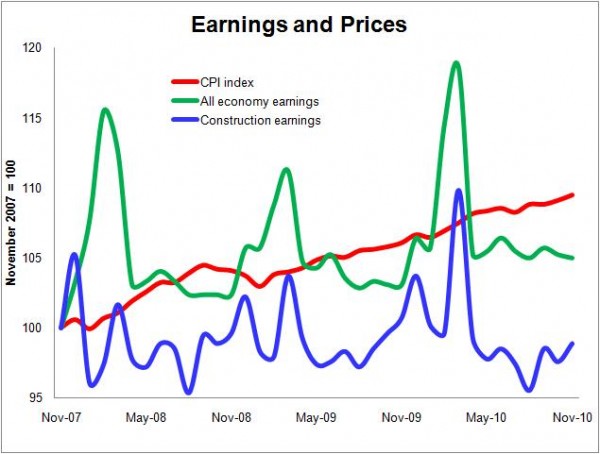Construction folk take more than the fair share of pain as inflation rises and earnings fall
With all the fuss about inflation and the impact that it is having on families, I thought I might just take a look at what its impact might be on construction folk.
So here are some very crude figures taken from the average weekly earnings non-seasonally adjusted data including bonuses and arrears.
Average weekly earnings in construction have dropped 1.1% between November 2007 and November 2010 according to the latest official figures.
 Meanwhile, across the whole economy earnings rose 5% over that period, with construction the only major sector recording a fall.
Meanwhile, across the whole economy earnings rose 5% over that period, with construction the only major sector recording a fall.
Here’s the bit you will like, the group that has done best (given the sector breakdown provided) is financial and business services, with an increase of 8.4%.
Unsurprisingly, given the nature of the recession, private sector average weekly earnings rose 3.8%, while the average in the public sector rose 7.9%. And it seems fair to assume the pain in future will be dished out more to the public sector than the private sector.
Naturally these figures are averages, so they are crude and inevitably we have to be careful how we interpret the figures. Averages have meaning, but not necessarily the one people often ascribed when absorbing data. For instance, if relatively speaking lots of well-paid construction folk had lost their jobs and few poorly paid folk, then the average would have dropped even though each individual might be doing pretty well in their own terms. And vice versa.
Also the figures are not seasonally adjusted and we are picking for convenience November 2007 to November 2010, as this is the latest recorded month.
But even taking account of the possibility of various forms of bias in the figures, they look pretty ugly for the hard-pressed folk scratching a living out of construction.
The graph above shows graphically how, since November 2007, avearge earnings in construction have fared worse than those in the economy as a whole and have lost considerable ground against inflation. (The sources for the graph are the average weekly earnings data and the consumer prices indicies. The data has been rebased to start at 100 on November 2007)
So let’s look at inflation over that period. In November 2007 the CPI index stood at 105.6 and RPI at 209.7 and RPIX (excluding mortgage interest payments) stood at 202.4, while the average weekly earnings in construction stood at £539. In November 2010 these were, respectively, 115.6, 226.8, 225.9 and £533. So we have inflation over that period on the CPI measure running at 9.47%, on the RPI measure at 8.15% and on the RPIX measure (often used for wage negotiations) at 11.61%.
That means that in real terms construction workers are about 10% or so worse off than they were three years ago. Or, according to my sums using the CPI measure on average construction folk are about £52 a week worse off in real terms, on the RPI measure about £46 a week worse off and on the RPIX measure at £61 a week worse off.
Not nice if you earn your living in construction, but also a bit worrying if you’re a construction business.
Given this level of suppression in labour costs, it will become increasingly tough for construction firms to push down further on wages. And with global commodity prices now creating an upward pressure on materials costs the room for manoeuvre for contracting firms is narrowing.
Little wonder then that the civil engineering contractors’ body CECA saw it wise yesterday to put out a press notice warning of the increasing dangers of inflation.